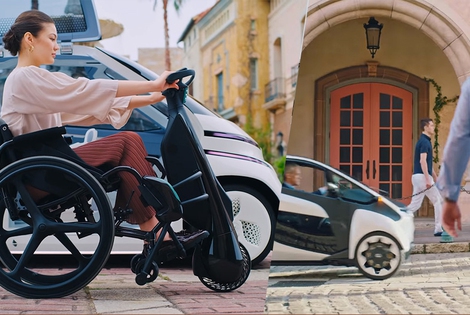
Milan has announced one of Europe’s most ambitious mobility schemes, known as Strade Aperte (open roads). Its goal is to reduce cars in phase 2 of the lockdown by increasing bike lanes and pedestrian areas.
In the Netherlands there are far many bicycles so much so they took up all the racks as well as public areas in big cities. That’s why the Dutch cycling embassy, a public private network operating in the field of urban planning and mobility in the Netherlands, is collaborating with the Dutch railway company to promote Ov-fiets, a
In the Netherlands there are far many bicycles so much so they took up all the racks as well as public areas in big cities. That’s why the Dutch cycling embassy, a public private network operating in the field of urban planning and mobility in the Netherlands, is collaborating with the Dutch railway company to promote Ov-fiets, a new bike sharing system integrated with public transport. The recipe? Low costs for the service, many bike-rental stations and season tickets including public transport tickets.
The problem in this case is not encouraging people to use bicycles, but pushing them to choose public transports and bicycles as well. “The Netherlands is the only country in the world to have more bicycles than inhabitants”, says Anita Dirix, member of the Dutch cycling embassy. “Every person has on average 1.2 bicycles. But we have a problem with the quality of public space. That’s why we’re interested in sharing bikes”.
There’s available a card with chip that allows to use the bike-sharing service as well as public means of transport. So, with this card it’s possible to take the metro, train and at the same time rent a bike for 3.5 euros daily. “So, you can reach the train station by bike, then leave it to the rental station and once arrived at your destination, rent another bike”.
Today there are more than 8,500 bicycles, which aren’t stored in the night, because they’re cheap and extremely resistant, in about 300 rental stations, most of which are located near train or metro station. Cost: 10 euros per year.
“Your service is expensive, both for the quality of the bicycles and because you have to store them every night”, says Anita when talking about BikeMi, the bike-sharing service adopted in Milan. “Unlike you, we aim at offering a low-cost service. Bicycles are just two-wheeled means of transport, they don’t have to be necessarily trendy”. While in Italy bikes are shared in order to reduce car traffic. In Northern Europe the problem is the opposite but the solution in this case is the same.
Siamo anche su WhatsApp. Segui il canale ufficiale LifeGate per restare aggiornata, aggiornato sulle ultime notizie e sulle nostre attività.
![]()
Quest'opera è distribuita con Licenza Creative Commons Attribuzione - Non commerciale - Non opere derivate 4.0 Internazionale.
Milan has announced one of Europe’s most ambitious mobility schemes, known as Strade Aperte (open roads). Its goal is to reduce cars in phase 2 of the lockdown by increasing bike lanes and pedestrian areas.
Formula 1, the world’s most important auto racing championship, has decided to turn the page and aim for carbon neutrality with the support of its teams, drivers and the whole racing circus.
Toyota and LifeGate began telling the story of hybrid mobility back in 2006, now, on the road to the Tokyo 2020 Olympics, they’re still treading the path of sustainable mobility. Here are the main steps of the journey.
Germany’s first solar bicycle lane could be the prototype for the roads of the future. The photovoltaic tiles melt snow and ice, and are capable of absorbing noise.
The Vespa is back in an electric version. Production has just started and the first models can be reserved online starting from October.
The city of Utrecht, in the Netherlands, is home to a bridge for cycling and walking that stretches over roof garden of a Montessori school. This project enhances practicality and will allow families to bring children to school by bike, passing through green areas. Despite their functionality, bridges are often seen as an infrastructure that is
The Lego hair bike helmet is the latest Internet craze. For now it’s just a prototype but production on a large scale will probably start soon.
Just as fires often give way to new growth, after the Dieselgate scandal, which saw Volkswagen cheating on US emission rules, the German car manufacturer radically changed course, beginning to focus on sustainable mobility. The German car company aims to propose thirty zero-emission models and produce at least one million battery electric vehicles by 2025. An ambitious mission
Sustainable, two-wheel mobility is triumphing in Copenhagen. After years of investments, policies, and infrastructural changes, bikes now outnumber cars in the city centre. The website Copenhagenize has released data linked to the number of vehicles entering the city centre, which are monitored by the city’s administration on a daily basis. Last year, 265,700 bikes have entered








